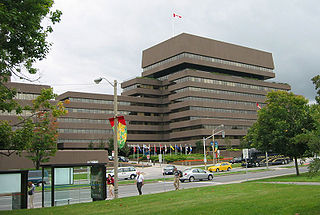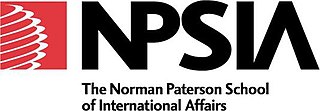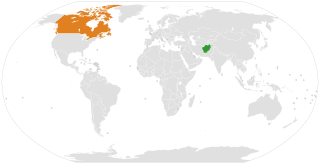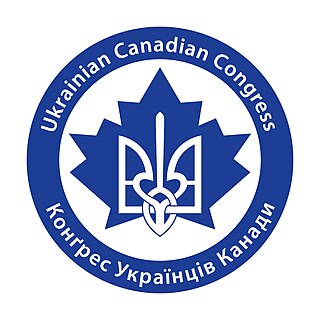
Hungary wields considerable influence in Central and Eastern Europe and is a middle power in international affairs. The foreign policy of Hungary is based on four basic commitments: to Atlantic co-operation, to European integration, to international development and to international law. The Hungarian economy is fairly open and relies strongly on international trade.

Since independence, Indonesian foreign relations have adhered to a "free and active" foreign policy, seeking to play a role in regional affairs commensurate with its size and location but avoiding involvement in conflicts among major powers. Indonesian foreign policy under the "New Order" government of President Suharto moved away from the stridently anti-Western, anti-American posturing that characterised the latter part of the Sukarno era. Following Suharto's ouster in 1998, Indonesia's government has preserved the broad outlines of Suharto's independent, moderate foreign policy. Preoccupation with domestic problems has not prevented successive presidents from travelling abroad.

The foreign relations of Mexico are directed by the President of the United Mexican States and managed through the Secretariat of Foreign Affairs. The principles of the foreign policy are constitutionally recognized in the Article 89, Section 10, which include: respect for international law and legal equality of states, their sovereignty and independence, non-intervention in the domestic affairs of other countries, peaceful resolution of conflicts, and promotion of collective security through active participation in international organizations. Since the 1930s, the Estrada Doctrine has served as a crucial complement to these principles.

The foreign relations of South Africa have spanned from the country's time as Dominion of the British Empire to its isolationist policies under Apartheid to its position as a responsible international actor taking a key role in Africa, particularly Southern Africa. South Africa was inactive in the United Nations, the African Union and the Commonwealth of Nations. Considered a possible permanent addition to the United Nations Security Council, South Africa was elected in 2006 and again in 2010 by the UN General Assembly to serve on the Security Council, which it did until 31 December 2012.Since, South Africa as also been elected as member of the UNSC for the 2019-2020 period.

Foreign relations of Australia are influenced by its position as a leading trading nation and as a significant donor of humanitarian aid. Australia's foreign policy is guided by a commitment to multilateralism and regionalism, as well as to strong bilateral relations with its allies. Key concerns include free trade, terrorism, refugees, economic co-operation with Asia and stability in the Asia-Pacific. Australia is active in the United Nations and the Commonwealth of Nations. Given its history of starting and supporting important regional and global initiatives, it has been described as a regional middle power par excellence.

Xinhua News Agency or New China News Agency is the official state-run press agency of the People's Republic of China. Xinhua is the biggest and most influential media organization in China, as well as the largest news agency in the world in terms of correspondents worldwide. Xinhua is a ministry-level institution subordinate to the State Council and is the highest ranking state media organ in the country alongside the People's Daily. Its president is a member of the Central Committee of the Communist Party of China.

The foreign relations of Canada are Canada's relations with other governments and peoples. Britain was the chief foreign contact before World War II. Since then Canada's most important relationship, being the largest trading relationship in the world, is with the United States. However, Canadian governments have traditionally maintained active relations with other nations, mostly through multilateral organizations such as the United Nations, the Commonwealth of Nations, La Francophonie, the Organization of American States, and the North Atlantic Treaty Organization (NATO).

The Embassy of the United States of America in Ottawa is the diplomatic mission of the United States of America in Canada. The embassy complex is located at 490 Sussex Drive in Ottawa, Ontario, and it opened in 1999.

The Norman Paterson School of International Affairs is a professional school of international affairs at Carleton University that was founded in 1965. The school is housed in Richcraft Hall, on Carleton's campus in Ottawa, Ontario, Canada. Students, alumni and faculty of NPSIA are referred to as NPSIAns.

The Hill Times is a Canadian twice-weekly newspaper, published in Ottawa, Ontario, which covers the Parliament of Canada, the federal government and other federal political news. Founded in 1989, the paper is owned by Jim Creskey and Ross Dickson. The editor is Kate Malloy.

Naela Chohan is a Pakistani ambassador, artist and diplomat. As a seasoned and veteran diplomat, ambassador Chohan has assumed a leadership position in eight different Pakistani diplomatic missions on five different continents. Naela Chohan is a hyperpolyglot with demonstrable fluency in seven Indo-European languages including Persian, French, and Spanish.

Brazil–Canada relations refers to the diplomatic relations between the Federative Republic of Brazil and Canada. In 2016, approximately 36,000 people in Canada claim to be of Brazilian descent. It's also estimated that there are around 12,000 people in Brazil that are of Canadian descent. Both nations are members of the G20, Organization of American States, United Nations and the World Trade Organization.

Canada–Israel relations refers to diplomatic, commercial and cultural ties between Canada and the State of Israel. Canada maintains an embassy in Tel Aviv and Israel maintains an embassy in Ottawa.

Afghanistan–Canada relations are relations between Afghanistan and Canada.

Canadian–Turkish relations are foreign relations between Canada and Turkey. Canada has an embassy in Ankara. Turkey has an embassy in Ottawa. Both countries are full members of the Organisation for Economic Co-operation and Development (OECD), the North Atlantic Treaty Organization (NATO), the Organization for Security and Co-operation in Europe (OSCE) and the World Trade Organization (WTO). Also Turkey is a full member of the Council of Europe (CoE) and Canada is an observer member of it. The recognition of the Armenian Genocide by the Canadian parliament has soured relations between the two countries.

Canada and Iran have had no formal diplomatic relations since 2012. Canadian consular and passport services are provided through other Canadian diplomatic missions in other countries in the Middle East while Iran maintains an interests section at the Embassy of Pakistan in Washington, D.C. The government headed by PM Justin Trudeau which took office in 2015, has reportedly been reviewing relations with Iran and, like most countries, lifted most of its economic sanctions following the Iran nuclear agreement in July 2015.

Canada–Kazakhstan relations are foreign relations between Canada and Kazakhstan. The countries established diplomatic relations with each other in 1992. Canada has an embassy in Astana. Kazakhstan has an embassy in Ottawa and a consulate in Toronto.

On 12 March 1985, agents of the Armenian Revolutionary Army attacked the Turkish embassy in Ottawa, Canada.

Austria–Canada relations refer to Interstate relations between Austria and Canada.

The Ukrainian Canadian Congress (UCC) describes itself as being the representative of the Ukrainian Canadian community before the people and Government of Canada, promotes linkages with Ukraine and identifies and addresses the needs of the Ukrainian community in Canada to ensure its continued existence and development for the enhancement of Canada's socio-cultural fabric. Originally known as the Ukrainian Canadian Committee, it was established as a result of the efforts of the Ukrainian Canadian community in November 1940 by the Government of Canada.



















